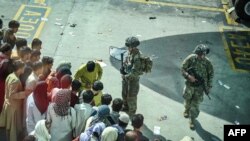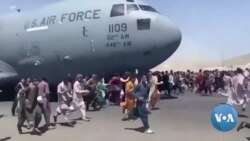As he watches the rapidly changing circumstances in Afghanistan unfold on his television screen at his home in Missouri, U.S. military veteran Steve Hutcherson is in shock.
“It’s difficult to watch,” he told VOA during a recent Skype interview. “You’ve seen the videos of the fall of Saigon and everything, and it’s kind of eerily similar. We’ve spent so much in human lives and national treasure to maintain what we have and you see it all gone in a flash.”
Afghanistan’s return to Taliban control is a personal setback for Hutcherson.
He was one of the many uniformed military personnel I interviewed during a 2002 visit to Afghanistan while working as a civilian broadcaster for the U.S. Department of Defense. I met Hutcherson while he was crouched over a radar screen in a dimly lit mobile trailer sitting near the flightline at Bagram airfield north of Kabul.
He was among the first wave of uniformed U.S. military forces sent to Afghanistan, working as an air traffic controller coordinating allied aircraft in combat and support missions aimed at eliminating the presence of terrorists in the country. It was an objective he believes succeeded.
“The result was that we’ve been safe for the last 20 years,” he told VOA. But Hutcherson also thinks the U.S. effort to build a new and democratic Afghan nation left America trapped in an “unwinnable war.”
“You are trying to fight an idea. You don’t fight an idea with weapons,” he said.
“I guess the shocking part to me is how quickly everything happened,” said Rhonda Lawson, who watched the rapid fall of the government in Afghanistan from her current home in Maryland. But nearly 20 years ago I also met and interviewed Lawson at her temporary home at Bagram Airfield, where she was serving as a non-commissioned officer for a U.S. Army mobile public affairs detachment. She observed efforts to train a new Afghan National Army as part of the U.S. military mission in Afghanistan.
“It does kind of change my view as to whether the Afghan National Army was prepared to defend their own country,” she explained to VOA during a Skype interview a day after Kabul fell to the Taliban. “I don’t know if it was a case of them not fighting or them failing but for the Taliban to have taken over as quickly as they did — as I said it was quite shocking.”
“We’ve spent an incredible amount of money to train their army to fight for themselves, and it doesn’t seem like they want to, for whatever reason I don’t know,” said Hutcherson, who retired from the U.S. Air National Guard but continues to work as a civilian air traffic controller in Missouri.
“If they don’t want to fight for themselves, we can’t stay there forever. There has to be a point where you just rip the band-aid off. If this was the best way to do it, I don’t know. But we’ve already spent 20 years there. What do we think will change in the next 20?”
At a peak during the “surge” in 2010-2011, about 98,000 U.S. forces were stationed in Afghanistan. Over 775,000 members of the military served at least once during a nearly 20-year presence in the country.
“After 20 years, I don’t think we need to have U.S. military forces on the ground there,” said Dan Millbauer during a recent interview conducted at his home in New Hampshire as the Taliban were making gains throughout Afghanistan.
Millbauer served with the U.S. Army’s “American Forces Network” and accompanied me during our assignment to Afghanistan in 2002. He later deployed for a longer mission to Afghanistan in 2004 with a “psychological operations” or PSYOP U.S. Army unit originally based at Fort Bragg, North Carolina. It was his last deployment before leaving the military in 2007.
“A place like Afghanistan has historically been problematic,” says Millbauer. “The Soviets tried. We tried for 20 years now to make things the way they should be. But if the Taliban rises to power again there is a reason for that and we’ll respond as we feel appropriate in the future.”
With the Taliban now seemingly in control of Afghanistan’s uncertain future, the exodus continues for those who wish to seek safety elsewhere, and still have the means to flee.







